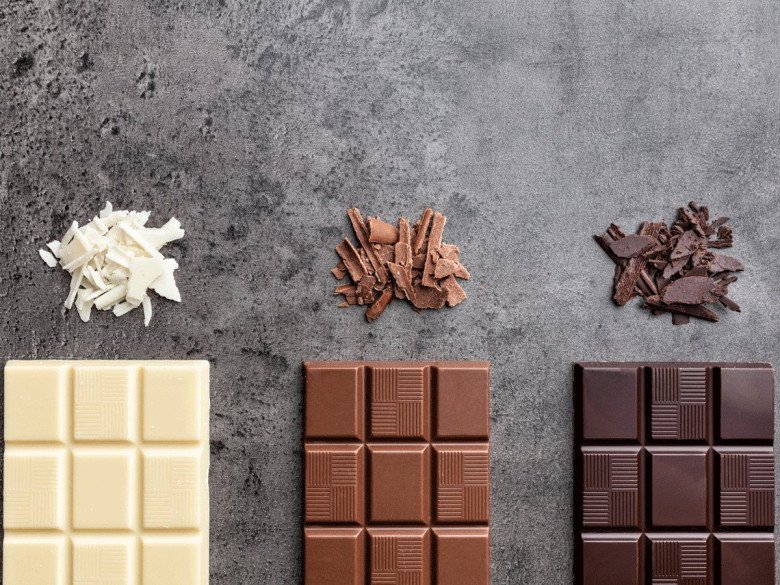Chocolate is made from the seeds of the tropical Theobroma cacao tree. It was first used from the Olmec civilization in ancient Mesoamerica. After Europeans discovered America, chocolate became popular all over the world and the demand for this product exploded. Since then, chocolate has become a food that millions of people enjoy every day thanks to its unique, rich and sweet taste.
But what are the health benefits of eating chocolate?
Chocolate consumption has long been associated with diseases such as diabetes, coronary heart disease, and high blood pressure. However, it is also a food that contains high levels of antioxidants. Several studies have shown that chocolate can lower cholesterol levels and prevent memory loss.

Chocolate is considered a sweet gift for lovers. (Illustration)
Some of the health benefits of chocolate
Chocolate gets a bad reputation because of its high fat and sugar content. Use of this product has been linked to acne, obesity, high blood pressure, coronary heart disease, and diabetes.
However, according to a review on the health effects of chocolate published in the Dutch Medical Journal, this product also has many good sides.
The authors point out that cocoa, an important ingredient in chocolate, contains bioactive phenolic compounds. This has changed people’s views of chocolate and prompted research into how it can affect the aging process and conditions such as oxidative stress, blood pressure regulation, and atherosclerosis.
Chocolate’s antioxidant potential can provide a variety of health benefits. The higher the cocoa content, as in dark chocolate, the greater the benefits. Dark chocolate may also contain less fat and sugar, but it’s important to check product labels.
It is important to note that the possible health benefits mentioned below are from a single study. More research is needed to confirm that eating chocolate actually improves health.
Also, chocolate bars contain more than just cocoa. The benefits and risks of other ingredients in these sweets, such as sugar and fat, also need to be considered.
1. Lowers cholesterol levels
One study, published in the Journal of Nutrition, found that eating chocolate can help lower levels of low-density lipoprotein (LDL) cholesterol, also known as “bad cholesterol.”
Researchers began to look at whether chocolate bars containing sterols (PS) and cocoa flavanols (CF) had any effect on cholesterol levels. The authors concluded: “Regular consumption of chocolate bars containing PS and CF, as part of a low-fat diet, may support heart health by lowering cholesterol and increasing blood pressure.”
Chocolate comes in a variety of colors, often associated with ingredients and brands. (Illustration)
2. Improve cognitive function
Scientists at Harvard Medical School (USA) have suggested that drinking two cups of hot chocolate a day can help keep the brain healthy and reduce memory decline in the elderly. Researchers found that hot chocolate increased blood flow to the part of the brain that needed it.
Lead author, Farzaneh A. Sorond, said: “Because different brain areas require more energy to complete tasks, they also require greater blood flow. This relationship, known as neurovascular coupling, may play an important role in diseases such as Alzheimer’s.”
The results of a laboratory trial published in 2014, showed that a cocoa extract known as lavado could reduce or prevent damage to nerve pathways in Alzheimer’s and Alzheimer’s disease patients. This extract may help slow down symptoms such as cognitive decline.
Another study, published in 2016 in the journal Appetite, found that eating chocolate at least once a week could improve cognitive function.
3. Reducing the risk of cardiovascular disease
Research published on BMJshows that chocolate consumption can reduce the risk of heart disease by up to a third.
Based on the observations, the authors conclude that higher chocolate consumption may be associated with a lower risk of cardiovascular metabolic disorders. They called for further experimental studies to confirm whether chocolate consumption is beneficial.
4. Reduce the risk of stroke
Canadian scientists, in a study involving nearly 44,500 people, found those who ate one serving of chocolate had a 22% lower risk of stroke than those who didn’t. In addition, people who ate about 30 grams of chocolate per week had a 46 percent lower risk of dying from stroke.
A further study, published in the journal Heart in 2015, tracked the impact of diet on the long-term health of 25,000 men and women. The results showed that eating up to 100 grams of chocolate a day can reduce the risk of heart disease and stroke.
5. Helping the growth and development of the fetus
Eating 30 grams of chocolate a day during pregnancy may benefit fetal growth and development, according to a study presented at the 2016 Maternity-Fetal Medicine Association Congress in Atlanta, (USA).

Chocolate has many health benefits but it can also cause some side effects. (Illustration)
6. Improve athletic performance
Chocolate can help athletes perform better while using less oxygen. Findings published in the Journal of the International Society of Sports Nutrition suggest that a little dark chocolate can improve oxygen delivery.
The authors studied cyclists participating in a British trial and found that: After eating dark chocolate, cyclists used less oxygen than when cycling at a moderate pace and were able to cycle longer distances in a two-minute pause test.
Scientists believe that the effectiveness of dark chocolate in this regard is that it contains flavonols called epicatechins, which increase the release of nitric oxide in the body. Beetroot juice has a similar effect.
Dark chocolate or milk chocolate, which is better?
Milk chocolate manufacturers claim that their products are healthier because they contain milk, while milk provides protein and calcium. Proponents of dark chocolate point to the product’s higher iron and antioxidant content.
Here are some examples of nutrient levels in milk chocolate and dark chocolate.
Nutrients in 100 grams of milk chocolate versus 100 grams of dark chocolate:
However, nutrition varies greatly in commercially available chocolate bars depending on the brand and variety you choose. It’s a good idea to check the label if you want to be sure of the nutrients in it.
Some of the side effects of eating chocolate and how to prevent it
Chocolate may have health benefits, but it also has some potential negative effects such as:
Causes of weight gain
Several studies have shown that chocolate consumption is associated with decreased body mass index (BMI) and body fat centers. However, chocolate can be high in calories because of its sugar and fat content. Anyone trying to lose weight or maintain weight should limit their chocolate consumption and check product labels when choosing.
High sugar content
The high sugar content in most chocolates can also cause tooth decay.
Migraine risk
Some people may experience increased migraines when eating chocolate regularly due to the tyramine, histamine and phenylalanine content in cocoa. However, further research on these cases is needed.
Effects on bone health
There is some evidence that chocolate can affect poor bone structure and osteoporosis. The results of a study published in the American Journal of Clinical Nutrition, showed that older women who ate chocolate every day had lower bone density.
Contains heavy metals
Some cocoa powder and chocolate bars may contain high levels of cadmium and lead, which are toxic to the kidneys, bones, and other body tissues.
In 2017, the Consumer Lab (USA) tested 43 chocolate products and found that almost all cocoa powder contained more than 0.3 mcg of cadmium per serving, the maximum level recommended by the World Health Organization. (WHO).
In general, eating chocolate can have health benefits and risks. So, as with any food, moderation remains the key.
at Blogtuan.info – Source: Eva.vn – Read the original article here





